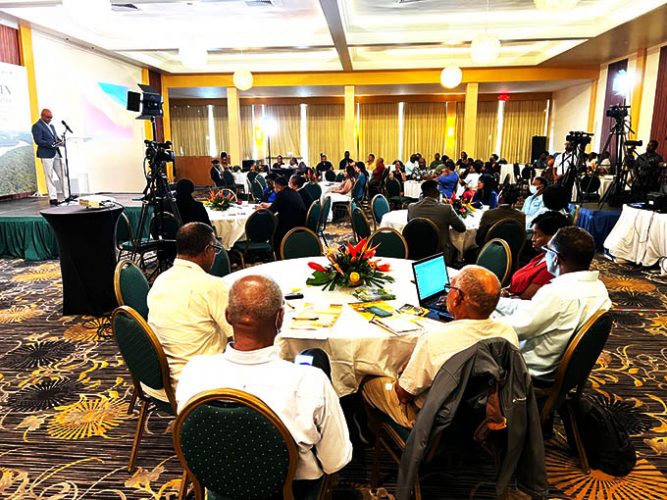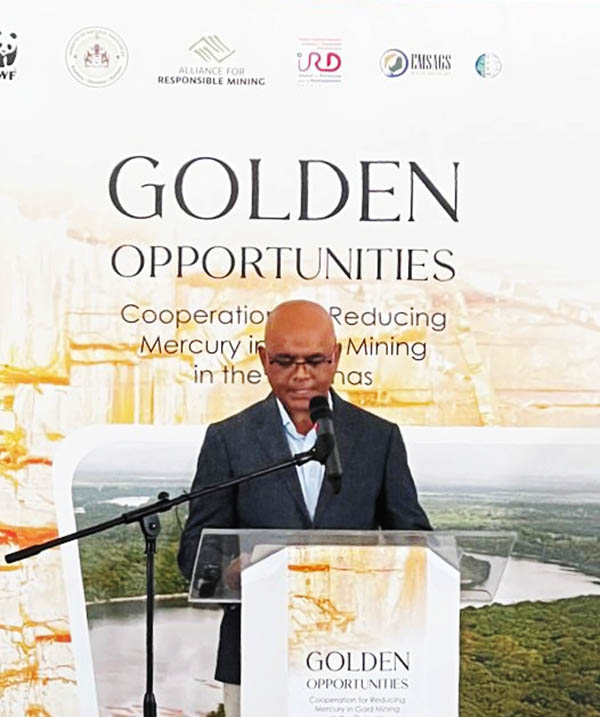Even as the Guianas are far away from achieving a 50% reduction in the use of mercury in artisanal and small-scale gold mining (ASGM), the efforts of the Guyana and Suriname governments and their international partners for a complete phase-out, is a step in the right direction, World Wildlife Fund (WWF) Director of Suriname and Guyana, Dr. David Singh said.
“We therefore welcome the numerous steps taken by the governments of Guyana and Suriname to address mercury use in the artisanal and small-scale gold mining sector,” Singh said on Monday. Singh was at the time addressing stakeholders from both countries, who participated in a one-day workshop on “Cooperation for reducing mercury in Gold Mining in the Guianas.” The workshop was hosted at the Pegasus Hotel and was aimed at advancing and promoting knowledge sharing and learning through multi-stakeholder discussions in tackling the mercury phase-out in the Guianas. He pointed out that it is important that they provide assistance to this category of miners since they do not have the opportunity and finances. Operators of this category he stressed are more about making a livelihood than profits.

“…even though most people might know the harmful effects of mercury, people are willing to take risks in mercury use as a means to earn a livelihood. But as with any activity, people will make rational choices based on four factors: (1) information, (2) available alternatives, (3) cost, and (4) confidence through peers,” he said before signalling his agency’s commitment to addressing the issue. Singh in his opening address said the WWF is working with the governments of Guyana, Suriname and French Guiana through France on a mercury phase-out from the ASGM sector with a focus on small operators who have a harder time to adapt to more sophisticated or expensive technologies. They are working closely with the Alliance for Responsible Mining (ARM), and the French National Research Institute for Sustainable Development (IRD), and with Guyanese and Surinamese stakeholders including academia.
He told the stakeholders gathered that while they are building from work that was done in the past, learning from the experiences of each country will aid greatly in advancing their cause.
“Through sharing of our knowledge, we will co-develop and facilitate coordination and cooperation among key stakeholders across Suriname, Guyana and French Guiana towards a sensible phasing out of the use of mercury in gold mining and the environment,” Singh emphasised.
With great effort and commitment to achieving the goals of a phase-out, he said that “WWF believes that the Guianas can be a beacon of hope to the world, where as a people we effectively demonstrate good sustainable development practices in which people and nature thrive together.”
Meanwhile, Suriname’s Permanent Secretary of Mining at the Ministry of Natural Resources, Precoiosa Simons in her brief address said that Suriname is focused on regulating the sector. Speaking from her country’s standpoint, she said that an alarming use of mercury within an unregulated sector will have an impact on human life and the environment.
Enforce
“Regulation of small-scale gold mining is necessary, in order to enforce environmentally responsible mining and processing activities, as well as to obtain an acceptable tax contribution. Therefore, this process starts with transforming illegality in the sector to a formal status as a smallholder,” she said. With this objective, she stated that Suriname is committed and has introduced a number of programmes to achieve its goals of phasing out the toxic metal from the environment. “The environmental issue, especially the use of mercury in gold mining, receives our priority attention. Efforts are therefore on the implementation of the large-scale integrated mining project in collaboration with NIMOS, UNDP, and other relevant actors such as WWF, to work on the transition of illegals to legality,” she outlined.
Guyana’s Minister of Natural Resources Vickram Bharrat, in his brief address also underscored the country’s efforts to the phase-out process. He stated that the mining industry is one of the key pillars of Guyana’s development and it [the mining industry] over the decades has contributed to the growth of the economy. Bharrat highlighted that in 2021 the gold mining sub-sector represented 8.8 percent of Guyana’s GDP, the third largest non-oil sector of the economy and more than 60 percent of its total non-oil export earnings. The Natural Resources Minister said that the government of Guyana is committed to ensuring that these golden opportunities which exist in the mining sector are sustained for generations to come. He added that the Low Carbon Development Strategy (LCDS) 2030 is a pathway that supports sustainable and low-impact mining by seeking to enhance the employment and economic benefits created by the mining sector, while advancing efforts to safeguard Guyana’s ecosystem services.
Pilot sites
In Guyana, Micobie and Campbell Town have been identified as pilot sites for the project while Compangiekreek and Krabudoin, a mining site in the Brownsweg Village were identified in Suriname. The next phase of the project in Guyana will see a re-assessment of the land at Micobie, which is to confirm the site as the most appropriate for the mercury-free mining equipment while in Campbell Town/Princeville a piece of land at a central point will be identified for the equipment to be installed. Once that is completed, ARMS will transport the gold drop to Micobie and commence mercury-free field demonstrations. They will also showcase the claw pan apparatus, another method for gold extraction in the mercury-free demonstration process. In Suriname, the team is working to complete their agreement with the village and will be moving to transport their machinery. Throughout the programme, which commenced over a year ago, the WWF will be providing technical support in the areas of competence, creating the enabling space of partners and competent agencies to collaborate and to thrive, and to leverage resources to the issue at hand. ARMs will function as the executing partner.
Monday’s workshop forms part of the wider work in the mercury use reduction project which is being implemented with key partners such as the French Facility for Global Environment (FFEM), the Global Environment Facility (GEF), the UNDP, IRD, EMSAGS, Ministry of Natural Resources of the Government of Suriname and the National Institute for Environment and Development in Suriname. The mercury phase-out project is currently being implemented by the Government of Suriname. The Project addresses the policy and institutional constraints to improved management of ASGM as a sector and is creating an enabling environment for the dissemination of environmentally responsible mining practices, WWF said.





